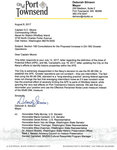The rumble of jet engines has spurred the Port Townsend City Council to send a letter to the commanding officer of Naval Air Station (NAS) Whidbey Island stating the city is “extremely …
This item is available in full to subscribers.
We have recently launched a new and improved website. To continue reading, you will need to either log into your subscriber account, or purchase a new subscription.
If you had an active account on our previous website, then you have an account here. Simply reset your password to regain access to your account.
If you did not have an account on our previous website, but are a current print subscriber, click here to set up your website account.
Otherwise, click here to view your options for subscribing.
* Having trouble? Call our circulation department at 360-385-2900, or email our support.
Please log in to continue |
|


The rumble of jet engines has spurred the Port Townsend City Council to send a letter to the commanding officer of Naval Air Station (NAS) Whidbey Island stating the city is “extremely disappointed” in how the Navy measures jet noise.
In an Aug. 8 letter to Capt. G.C. Moore, commanding officer of NAS Whidbey Island, Mayor Deborah Stinson wrote that the city was displeased that the Navy decided to use a 65-decibel measurement called the “day-night average sound level” (DNL) in the “area of potential effect” (APE).
“Growler operations are not constant – they are intermittent,” Stinson wrote.
“The fact that using the 65 dB DNL standard is a ‘longstanding practice’ among federal agencies does not change the fact that averaging intermittent noise as if it was constant noise has the practical effect of severely limiting the APE to parts of Whidbey Island, while ignoring the very real effects on Port Townsend’s historic districts.
“We ask that you reconsider your position and use the Effective Perceived Noise Level measure instead of the 65 dB DNL measure,” she wrote.
The letter was copied to Sens. Patty Murray and Maria Cantwell, Rep. Derek Kilmer and state representatives.
Stinson said during an Aug. 7 council meeting that a previous city request on the matter had been declined.
Stinson’s earlier draft of the letter was milder, but council member Michelle Sandoval on Aug. 7 urged Stinson to beef it up.
“I’d love it to be stronger … you’re way too polite,” Sandoval said as the sound of jet noise filled the council chambers for more than 20 minutes.
“For them to not have to abide by the laws, as we are a historic district, is pretty disheartening … it’s not OK,” Sandoval said.
“We have no clout. We can’t sue the Navy,” council member Pam Adams said.
City Attorney Steve Gross disagreed.
“Of course, you can sue the federal government,” Gross said.
“Anybody can sue anybody. One of the things that we’d be looking at that is an issue is that the Navy’s decision only has to not be arbitrary and capricious, and so any reasonable set of facts that they use to justify it is more likely than not going to be upheld by a federal court,” Gross said.
“Oh, I get it. Doesn’t mean that I’m happy about it,” Sandoval said.
In March, the state Board of Health and the state Department of Health requested health impact assessments related to NAS Whidbey Island, with the Department of Health agreeing to help conduct the assessment if the Navy should refuse.
Jefferson County commissioners sent the Navy a letter Feb. 21, in response to NAS Whidbey Island’s request for comments on environmental impacts of Growler jet operations. The letter cited concerns about loss of sleep for citizens, quality of life, property values and tourist traffic resulting from military jet noise exposure.
The Navy conducted a number of open houses in December on a draft environmental impact statement (EIS) about the impact of increased testing of EA-18G Growler aircraft originating from NAS Whidbey Island. A final EIS is expected later this year.